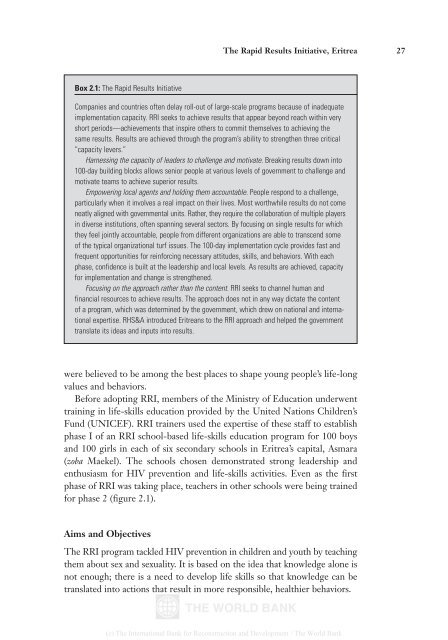a sourcebook of hiv/aids prevention programs volume 2
a sourcebook of hiv/aids prevention programs volume 2
a sourcebook of hiv/aids prevention programs volume 2
Create successful ePaper yourself
Turn your PDF publications into a flip-book with our unique Google optimized e-Paper software.
The Rapid Results Initiative, Eritrea 27Box 2.1: The Rapid Results InitiativeCompanies and countries <strong>of</strong>ten delay roll-out <strong>of</strong> large-scale <strong>programs</strong> because <strong>of</strong> inadequateimplementation capacity. RRI seeks to achieve results that appear beyond reach within veryshort periods—achievements that inspire others to commit themselves to achieving thesame results. Results are achieved through the program’s ability to strengthen three critical“capacity levers.”Harnessing the capacity <strong>of</strong> leaders to challenge and motivate. Breaking results down into100-day building blocks allows senior people at various levels <strong>of</strong> government to challenge andmotivate teams to achieve superior results.Empowering local agents and holding them accountable. People respond to a challenge,particularly when it involves a real impact on their lives. Most worthwhile results do not comeneatly aligned with governmental units. Rather, they require the collaboration <strong>of</strong> multiple playersin diverse institutions, <strong>of</strong>ten spanning several sectors. By focusing on single results for whichthey feel jointly accountable, people from different organizations are able to transcend some<strong>of</strong> the typical organizational turf issues. The 100-day implementation cycle provides fast andfrequent opportunities for reinforcing necessary attitudes, skills, and behaviors. With eachphase, confidence is built at the leadership and local levels. As results are achieved, capacityfor implementation and change is strengthened.Focusing on the approach rather than the content. RRI seeks to channel human andfinancial resources to achieve results. The approach does not in any way dictate the content<strong>of</strong> a program, which was determined by the government, which drew on national and internationalexpertise. RHS&A introduced Eritreans to the RRI approach and helped the governmenttranslate its ideas and inputs into results.were believed to be among the best places to shape young people’s life-longvalues and behaviors.Before adopting RRI, members <strong>of</strong> the Ministry <strong>of</strong> Education underwenttraining in life-skills education provided by the United Nations Children’sFund (UNICEF). RRI trainers used the expertise <strong>of</strong> these staff to establishphase I <strong>of</strong> an RRI school-based life-skills education program for 100 boysand 100 girls in each <strong>of</strong> six secondary schools in Eritrea’s capital, Asmara(zoba Maekel). The schools chosen demonstrated strong leadership andenthusiasm for HIV <strong>prevention</strong> and life-skills activities. Even as the firstphase <strong>of</strong> RRI was taking place, teachers in other schools were being trainedfor phase 2 (figure 2.1).Aims and ObjectivesThe RRI program tackled HIV <strong>prevention</strong> in children and youth by teachingthem about sex and sexuality. It is based on the idea that knowledge alone isnot enough; there is a need to develop life skills so that knowledge can betranslated into actions that result in more responsible, healthier behaviors.(c) The International Bank for Reconstruction and Development / The World Bank

















